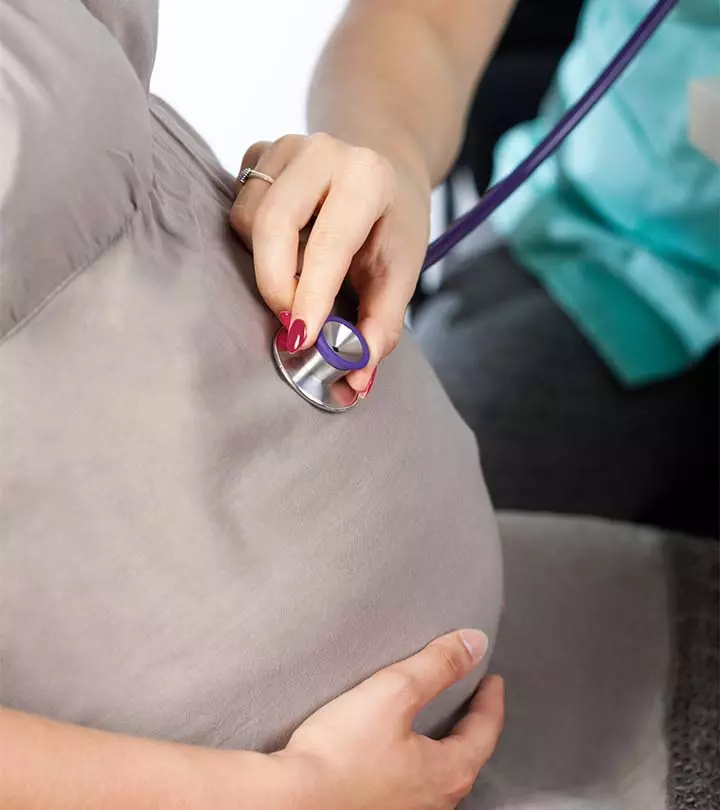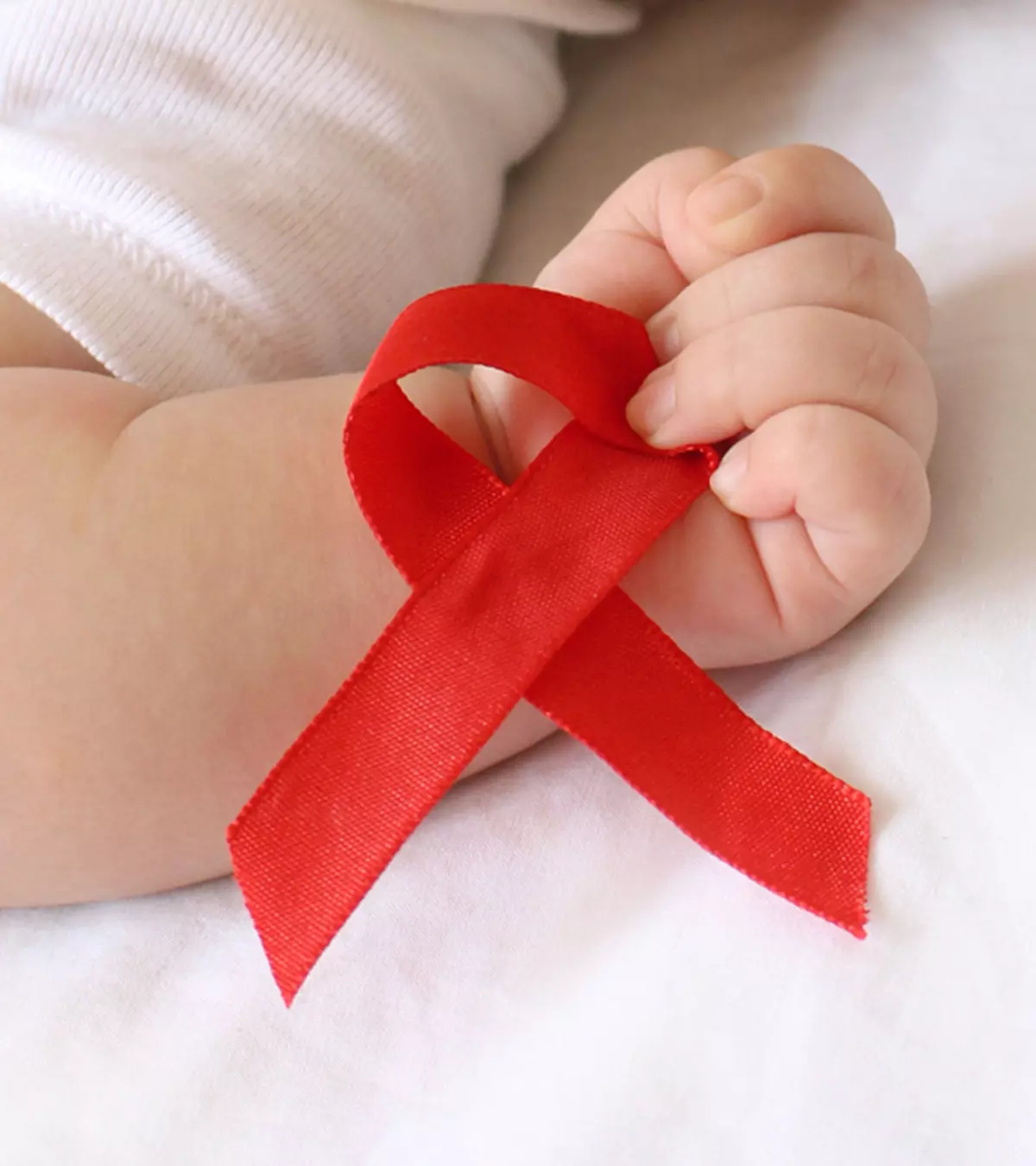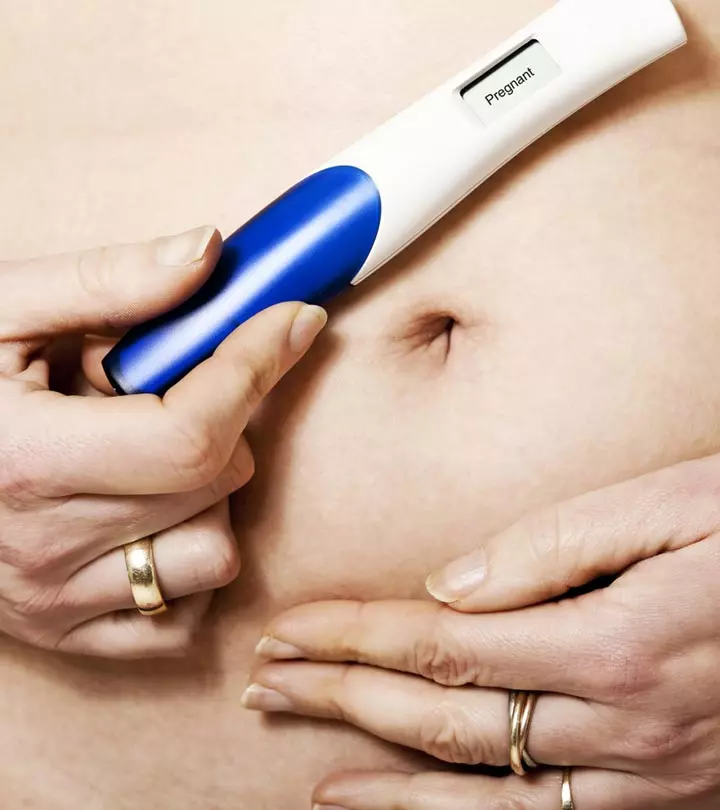
Image: iStock
Group B streptococcus (GBS) infection, also known as group B strep disease, is a common bacterial infection caused by Streptococcus agalactiae. Group B strep in pregnancy occurs when a pregnant woman contracts the infection and is referred to as being colonized by the bacteria. These bacteria commonly live in the human body, particularly in the genitourinary and gastrointestinal tracts, and usually don’t cause any harm. However, a pregnant woman can pass the infection to the baby during delivery, potentially affecting their health. While most babies are not affected, some may develop adverse health issues if infected (1).

Keep reading to learn the causes, symptoms, diagnosis, and treatment of group B strep disease in pregnancy.
Key Pointers
- Group B strep infection isn’t uncommon and can affect babies during labor or delivery.
- Pregnant women should be screened for GBS in the last trimester of pregnancy.
- Antibiotic treatment during or at least four hours before labor can help prevent the infection from spreading from a GBS-positive mother to the baby.
- Prompt treatment of newborns tested positive for GBS helps prevent severe and long-term complications.
How Do You Get Group B Strep During Pregnancy?

The group B strep bacteria may live in the vagina or rectum of a pregnant woman. About a quarter of all healthy women are estimated to carry it (2). However, when the bacterium begins to invade the body, it might cause infections, which are known as GBS disease (3). Certain risk factors that may considerably increase an expecting woman’s risk of developing an infection include (1) (4):
- Belonging to African or American ethnicities
- Young maternal age
- Gestational age of more than 37 weeks
- History of GBS disease in a previous pregnancy
- Being at risk of intra-amniotic infections or membrane rupture
- Having multiple sexual partners and unprotected intercourse
- Maintaining a poor hand hygiene
- Having a higher BMI
Pregnant women who get infected with bacteria as a result of improper prenatal care, may transmit it to their babies before or during delivery when the baby comes into contact with the bacteria in the mother’s genital tract, either through ruptured membranes or during vaginal birth.
 Did you know?
Did you know?How Common Is Group B Strep In Pregnancy?
Group B strep colonizationiPresence of the microorganism in/on the host is quite common during pregnancy. According to the US Centers For Disease Control And Prevention (CDC), “About 1 in 4 pregnant women carries GBS bacteria in their body (5).” However, this rate may vary based on the population and location.
What Are The Symptoms Of Group B Strep In Pregnancy?
Group B strep infection during pregnancy may not cause symptoms or maternal health complications, so often, as the infection is asymptomatic. However, in some cases, the mother may experience symptoms such as fever, increased heart rate, and abdominal pain during pregnancy (6). Since these symptoms may also occur due to other medical conditions, consult a doctor for proper diagnosis and treatment.

While many women with group B strep infection may not show symptoms, there is still a risk that they may pass the infection to the baby (maternal-fetal transmission), which may cause health complications for the mother. Signs and symptoms that may indicate an increased risk of vertical transmissioniPassing of the infection from the mother to the fetus include (2):
- Chills or fever during labor
- Premature rupture of membranes
- Breathing difficulties
- Preterm birth or labor
Although not all babies born to mothers with GBS may become severely ill, prompt testing can help protect the baby from the infection.
Will You Be Tested For Group B Strep During Pregnancy?
According to the American College of Obstetricians and Gynecologists (ACOG) and American College of Nurse-Midwives (ACNM), pregnant women should get tested for group B strep infection as a part of their routine prenatal screening during their 36th to 37th week of pregnancy to ensure timely intervention and protect the newborn (7).
Testing during the later weeks of pregnancy is preferred because the presence of bacteria may fluctuate naturally in a person’s body. As a result, a woman may test positive for the bacteria at one time and negative at another. Therefore, testing closer to delivery is recommended for women.
The test is typically a swab culture, performed by taking samples from a woman’s vaginal and rectal region using a sterile swab or Q-tip. It takes less than a minute and should not cause any pain. Furthermore, the test results are obtained in 72 hours, and a positive result means that they carry the bacteria and are at an increased risk of passing it to the baby during birth (6).

In some cases, the doctor may order a urine test, especially if you have a history of GBS in previous pregnancies. For the test, they will ask you to collect a clean-catch specimeniA method of collecting a urine sample for testing for appropriate analysis (8).
What Happens After Testing Positive For Group B Strep During Pregnancy?
If you test positive, the doctor may advise antibiotic therapy, typically administered through an IV, during labor or at least four hours before giving birth.
Antibiotic treatment is crucial as it is the most effective way to protect the baby from infection and minimize their risk of early-onset GBS (8) (9).
 Point to consider
Point to considerCan Group B Strep In Pregnancy Affect A Developing Fetus?

Generally, a developing fetus is not affected by maternal infection before birth (6), and some women may also go on to give birth to healthy babies while being carriers of GBS (10). However, if GBS infection is detected during pregnancy, discussing the possibility of vertical transmission, treatment options (if required), and necessary precautions to avoid any adverse outcomes such as fetal distress is crucial. Despite that, per the Centers for Disease Control and Prevention (CDC), the mortality risk is 4% to 6% in infants who acquire GBS disease (equivalent to 2 to 3 out of every 50 babies).
What Are Long-Term Problems Of Group B Strep In Newborns?
If a baby develops a GBS infection in the first week after birth, it is known as an early-onset group B strep infection. Newborn babies with infection usually have signs and symptoms in the first 24 hours after birth. These may include (10) (11):
- Trouble breathing or a slow or very fast heart rate
- Prolonged crying or fussiness
- High or low body temperature

- Sudden blood pressure changes
- Extreme tiredness or unresponsiveness
- Vomiting or feeding difficulties
On the other hand, some babies may develop symptoms seven or more days after birth. It is known as late-onset GBS infection and is not usually associated with pregnancy, which means that the baby probably got exposed to the infection from other sources and not their mother (10). The symptoms of late-onset GBS may include (9) (11):
- Feeding difficulties
- Decreased body movements
- Red areas on the face or other body parts
- Fever
- Fussiness
 Point to consider
Point to considerIf you spot any of the above signs in your newborn, get them evaluated immediately, as babies usually recover well with prompt treatment. However, in rare cases, the infection (specifically the late-onset disease) may lead to severe neonatal health complications such as sepsisiSevere immune response to infection , vision or hearing loss, and meningitisiInflammation of the fluid and protective layers of the central nervous system (9) (5).
Frequently Asked Questions
1. Do I need treatment for group B strep if I have a c-section?
C-section delivery could reduce the risk of a baby being exposed to GBS during childbirth, but it does not entirely eliminate the risk of infection. Therefore, if you are planning for a c-section and have tested positive for GBS infection, your doctor will decide whether or not you need treatment for the condition. Women with an intact amniotic membrane may not need antibiotic therapy (9) (4).
2. What if I go into labor before my group B strep results are available?
If you are at high risk for group B strep disease, your doctor may prescribe treatment before test results are available (11). However, if you are in labor, you must go to the hospital immediately for appropriate care. Antibiotic therapy during labor or delivery can protect the baby from early-onset GBS, but it does not prevent late-onset GBS (12).
3. Can I pass group B strep to my family members?
You are unlikely to pass the infection to your children or any other family member as the bacteria doesn’t spread through casual contact (3).
4. Can strep B infection cause smelly discharge?
A group study demonstrated that women with a GBS infection might experience an abnormal vaginal discharge with or without odor (13).
5. Is group B strep infection completely curable?
Most people who receive prompt and appropriate treatment recover fully without complications. However, in some cases, the infection may lead to adverse complications. Therefore, seeking medical treatment as soon as possible is vital if you suspect you may have a group B strep infection.
Group B strep in pregnancy is caused by a bacteria commonly found in healthy individuals, including pregnant women. The bacteria are typically harmless but can pass from the mother to the baby during childbirth and may cause adverse complications in rare cases. Therefore, getting screened for GBS during pregnancy and receiving timely and appropriate treatment is vital. Antibiotic therapy during delivery can help protect the baby from the infection and avert the risk of potential complications, which may otherwise prove fatal.
Infographic: Prevention And Management Of Group B Strep
Although complete prevention of Group B Streptococcus (GBS) infection during pregnancy is unlikely, specific preventive measures can significantly decrease the risk of severe health problems for the mother and the newborn. Our infographic below provides information on effective and ineffective strategies that can help reduce the risk of GBS infection during pregnancy and after childbirth. Read and share it with fellow would-be moms to spread awareness about the infection.
Some thing wrong with infographic shortcode. please verify shortcode syntax
This video gives vital information for expecting mothers about group B strep, a prevalent bacteria that can cause serious diseases in newborns. Watch this educational video to learn more.
References
- Hanna M and Noor A; Streptococcus Group B.
https://www.ncbi.nlm.nih.gov/books/NBK553143/ - Group B Strep Infection: GBS.
https://americanpregnancy.org/healthy-pregnancy/pregnancy-complications/group-b-strep-infection/ - Causes and How It Spreads.
https://www.cdc.gov/group-b-strep/about/ - Prevention of Perinatal Group B Streptococcal Disease.
https://www.cdc.gov/mmwr/pdf/rr/rr5910.pdf - Symptoms of Group B Strep Disease.
https://www.cdc.gov/group-b-strep/symptoms/index.html - Group B Strep Pregnancy.
https://my.clevelandclinic.org/health/diseases/11045-group-b-streptococcus–pregnancy#symptoms-and-causes - Preventing Group B Strep Disease.
https://www.cdc.gov/group-b-strep/testing/ - Strep B Test.
https://medlineplus.gov/lab-tests/strep-b-test/ - Group B Strep and Pregnancy.
https://www.acog.org/womens-health/faqs/group-b-strep-and-pregnancy - What are the risks of group B streptococcus (GBS) infection during pregnancy?
https://www.nhs.uk/conditions/group-b-strep/ - Group B Streptococcus Infection in Babies.
https://www.cedars-sinai.org/health-library/diseases-and-conditions—pediatrics/g/group-b-streptococcus-infection-in-newborns.html - Group B strep test
https://www.pregnancybirthbaby.org.au/group-b-strep-test - Catherine M. Leclair et al. (2010); Group B Streptococcus: Prevalence In A Non-Obstetric Population.
https://www.ncbi.nlm.nih.gov/pmc/articles/PMC2898746/
GBS in Pregnancy: Essential Guide to Testing & Prevention
Watch this essential video to understand group B strep risks and screenings, learn key preventive measures like antibiotic therapy before labor, and keep your baby safe. Watch now!
Community Experiences
Join the conversation and become a part of our nurturing community! Share your stories, experiences, and insights to connect with fellow parents.
Read full bio of Dr. Swati Chitnis
- Dr. Swati Chitnis is a gynecologist and endoscopic surgeon with over 8 years of experience. She did her bachelor in medicine at BJ Medical College & Sassoon Hospital, Pune, India and MS at the prestigious King Edward Memorial Hospital, Mumbai. She worked in various hospitals in Mumbai and currently runs her private practice.
 Dr. Swati Chitnis is a gynecologist and endoscopic surgeon with over 8 years of experience. She did her bachelor in medicine at BJ Medical College & Sassoon Hospital, Pune, India and MS at the prestigious King Edward Memorial Hospital, Mumbai. She worked in various hospitals in Mumbai and currently runs her private practice.
Dr. Swati Chitnis is a gynecologist and endoscopic surgeon with over 8 years of experience. She did her bachelor in medicine at BJ Medical College & Sassoon Hospital, Pune, India and MS at the prestigious King Edward Memorial Hospital, Mumbai. She worked in various hospitals in Mumbai and currently runs her private practice.
Read full bio of Vidya Tadapatri
Read full bio of Rebecca Malachi
Read full bio of Dr. Joyani Das

 Quick fact
Quick fact















